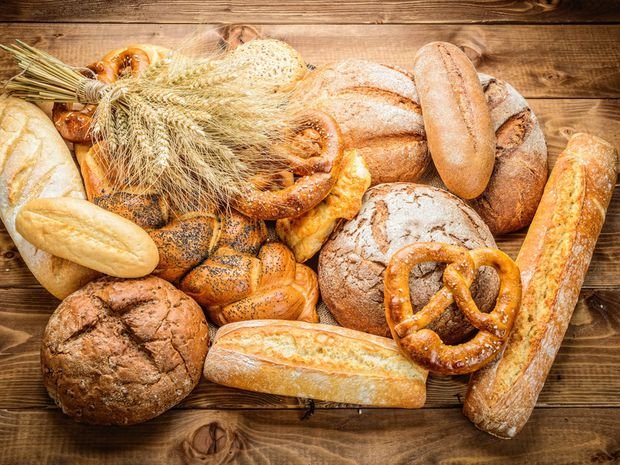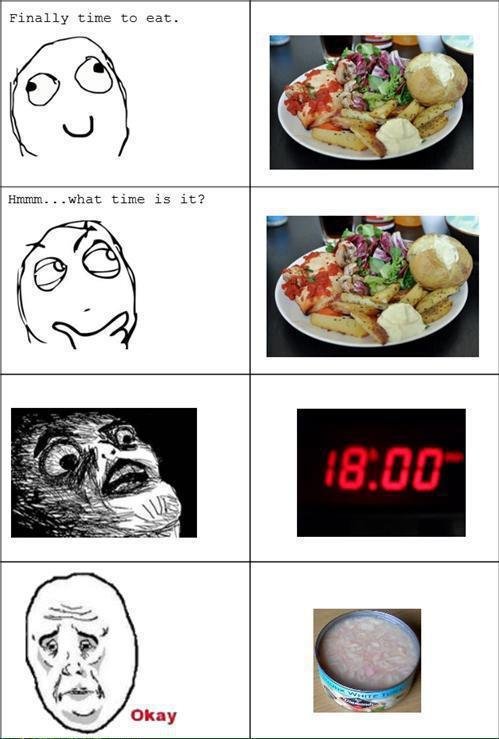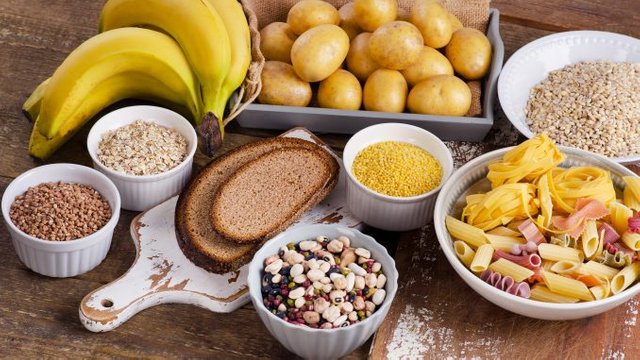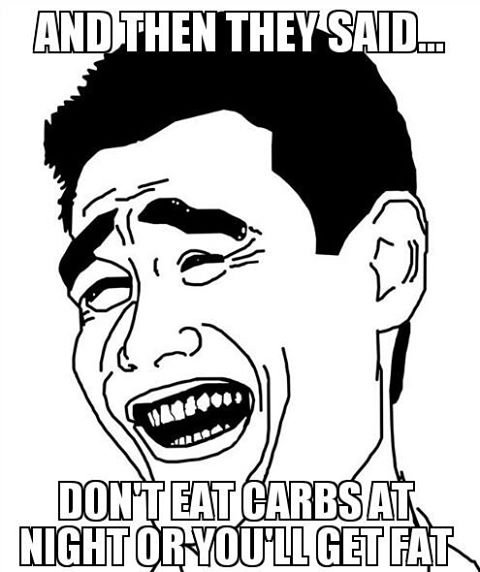
Carbohydrates at night: the real evil?
There are several things that everyone in the fitness industry and can certainly be heard. You have to eat eight meals a day for one serving only eat around 20 grams of protein because they can not spend more body, only heavyweights go, if you go to a bulk phase and light weights with high reps when diet. It's all a question mark
Question is little sign that prevails in bodybuilding or fitness, with anecdotal reports of various (big) guys are considered more trustworthy than scientific research.
Question mark in Action
Man, you must have a fast 5 g per kg of body weight maltodextrin or dextrin and now 30 grams of BCAA immediately after the end of exercise, otherwise you will be in a huge catabolism! Also, if you eat every two to three hours, you'll also be in the catabolism. Your muscles will crumble! Indeed, it said that one big guy, so it must be true!
Many things could have been in real estate quickly despite the fact that they really are question marks. It also addresses the debate about whether carbohydrates at night are OK or not. You can not consume the amount of carbohydrates at night because every gram of carbohydrate will go to fat stores. This is according to many fitness (experts), the quality of reporting to the worse than Barbie house reality. So let's look at whether the carbs in the evening are really harmful to the body, or is it just another myth in the diet.

So where this myth or the phrase "no carbs at night 'come from?
in order to properly assess the fitness statement, we need to understand why it is recommended to limit carbohydrates in the evening or at night times. The claim is that if you go to sleep, your metabolism slows down and consumed carbohydrates will have a greater chance of being stored in fat deposits. If you ate them in the morning or in the morning, they will be burned because the metabolism is fast in the morning. It seems to be a wise statement, "smart" but sounds each known question mark. It also says that insulin sensitivity is reduced at night, and then eaten carbohydrates stored in fat and muscle circumvented.
Let's first look at the matter of slowing down the metabolism of the night. The logic of this theory seems to be smart, because you're lying in bed, you do not move to more simply, so obviously consume less calories than when you're awake, working or even just sit in a chair and watch TV. Thus burn more calories than just sleeping in, right? Research, study actually http://www.ncbi.nlm.nih.gov/pubmed/19394978 MR. Katayosea and company. Which showed that the energy expenditure during the night is reduced in the first half of sleep by approximately 35%. However http://www.ncbi.nlm.nih.gov/pubmed/10099943 studies http://www.ncbi.nlm.nih.gov/pubmed/11896493 have shown that during the second half of sleep, increased energy expenditure, which is related to REM sleep stage. So we have ups and downs in the rate (value) metabolism during sleep (SMR = sleeping metabolic rate), but what is the overall effect? Interestingly, the least it can be demonstrated that the mean total energy expenditure during sleep is somehow different than at a rate (value) for resting metabolism, respectively. during the day (RMR = resting metabolic rate). http://www.ncbi.nlm.nih.gov/pubmed/12904638 all it has been shown to significantly increase the value of the exercise SMR, leading to increased fat oxidation during sleep. This seems to be the theory with data from MR. Zhang that obese individuals have lower SMR than their RMR, while thin subjects SMR are significantly higher than their RMR. So not only did not slow down your metabolism during sleep, in fact, its value increases. The idea that you'll avoid carbs at night because your metabolism slows down and you do them "not burn" is wrong.

the entire sentence "do not eat carbs at night 'and the matter is thus a question mark, right?
While fear of carbs in the evening smells like a question mark, but before we head verdict, let's look at other things. Question about insulin sensitivity and glucose tolerance. This is the time when things are starting to quite interesting. Compared with the morning meal, blood glucose and insulin remain elevated for longer decide with the evening meal. This is proof that you should not consume carbs at night, right? But wait. Although insulin sensitivity and glucose tolerance seem to be worse at night compared to morning meals, it is important to remember that the food in the morning after overnight fast and fasting increases sensitivity to insulin. That is perhaps more makes sense as comparing meals during the day and at night. In this case, there is no difference in insulin sensitivity, and glucose tolerance http://www.ncbi.nlm.nih.gov/pubmed/8901836 . Thus, it appears that insulin sensitivity and glucose tolerance are not necessarily reduced by the night, but to is enhanced fasting overnight.
Differences
Although it may be good to talk about the details or generally complex mechanisms of metabolism, it is necessary to know whether there is also a difference at this point. The study examined precisely this question. Researchers from Israel have given people in 6 month-old baby, which reduced overall calories. They divided them into two groups - control group and the experimental group. Each group consumed the same amount of calories, protein, carbohydrate and fat, but the time income was significantly different. One group (control) consume carbs during the day while the second (experimental) group consumed carbohydrate intake in the evening and at night (approximately 80% of the total). Result after 6 months was shocking for many people. Not only did the experimental group, who consumed carbohydrates at night, lost substantially more body fat, but it also had a greater feeling of satiety and less hunger than the control group. so ?!
Now I'm sure all of you who observes the the typical fitness reports, where you eat six or eight times a day and you have most of your carbs earlier in the first half or. during the day, do you think if I did not eat carbohydrates more than 2-3 watch, I'd be hungry! "Well, I'm afraid are entering into a vicious circle. When you consume a small amount of carbohydrates often, basically you pump glucose into your system. When disposing of glucose, your body releases insulin to move glucose into cells. Excessive secretion of insulin, however, may increase hunger. While the opposite is true. If you consume carbs less often with longer intervals between their consumption, should you less hungry because your body would begin a process of dealing with the endogenous production of glucose and your blood sugar level would leave the stable. If you consume carbohydrates every 2-3 hours, the process of glucose production (gluconeogenesis) is impaired and the body must rely on exogenous carbohydrate intake for maintaining a blood sugar level.
From the beginning until the body gets used to the transition from eating carbs every 2-3 hours for their consumption at a much earlier time intervals, in the early days you feel hunger because the body is first on the change in the process of gluconeogenesis must adapt. But once you reconfigure, you will find that you will be far less hungry. This is actually what the researchers found in previous studies.

What about the fat loss?
What is the explanation that the other group consuming carbs at night, losing a lot more body fat than the control group. The researchers hypothesized that the difference can create more favorable changes in hormones. The default value of insulin in the experiment by the consumption of carbohydrates per night was significantly lower than when consuming carbohydrate during the day. Moreover the experimental group had much higher levels of adiponectin, a hormone that is associated with increased sensitivity to insulin in the issue of fat burning. They also had slightly elevated levels of leptin. Moreover the night eaters had lower LDL (bad) cholesterol and increased HDL (good) cholesterol. Overall people who have most of their intake of carbohydrates eaten in the evening, lost more fat and had better results than those who consumed carbohydrates throughout the day.
What's the verdict?
I'm not ready to say that we should all eat most carbohydrates in the evening or at night. I would like that this study was repeated with that process would compare one big meal full of carbohydrates in the morning with one meal full of carbohydrates at night. While this small study compared more carbohydrate meals throughout the day with one carbohydrate meal in the evening. So it may be that the beneficial effects caused more generally to some limited amount of carbs (and insulin secretion). But, I think what we can say relatively sure is that eating carbohydrates at night does not lead to an increase in fat or in a deterioration of burning fat compared with consumption during the day, so officially we can "eating carbohydrates at night is bad" Mark question mark! Alan Aragon

Follow me
I Just Love Those Carbs
it Seems That I Can Eat Carbs
As Long As I Exercise
I will Keep My Weight Down
Pasta is My Favorite Carbohydrate
I Love Pasta in Pasta Salad, All Kinds of ways
Downvoting a post can decrease pending rewards and make it less visible. Common reasons:
Submit
pasta are excellent, I recommend whole grain!
Downvoting a post can decrease pending rewards and make it less visible. Common reasons:
Submit
To be honest I have tried many methods and I think it comes down to a number of actual calories we eat and burn and as long as we keep our macronutrients in check for our particular goal then I don't think it matters. What I did do was an experiment where I only ate protein from around 7pm , so I would have a chicken breast and 2 egg whites for the last snack and then some casein right before bed to release protein while asleep. But that was only when I was training an insane amount of weights and cardio and I actually lost to much weight, due to lack of carbs. So it comes down to balance as well.
Everyone reacts different and you need to experiment before reaching your target
I think it comes down to one demon and that is sugar. As long as you don't eat processed sugar and you have the right macros for goals and portion control I think everything is coatia.
Downvoting a post can decrease pending rewards and make it less visible. Common reasons:
Submit
right, balance of macronutrients is the main thing + insulin and cortisol!
I am not proponent of the carbohydrate-free diet.
Downvoting a post can decrease pending rewards and make it less visible. Common reasons:
Submit